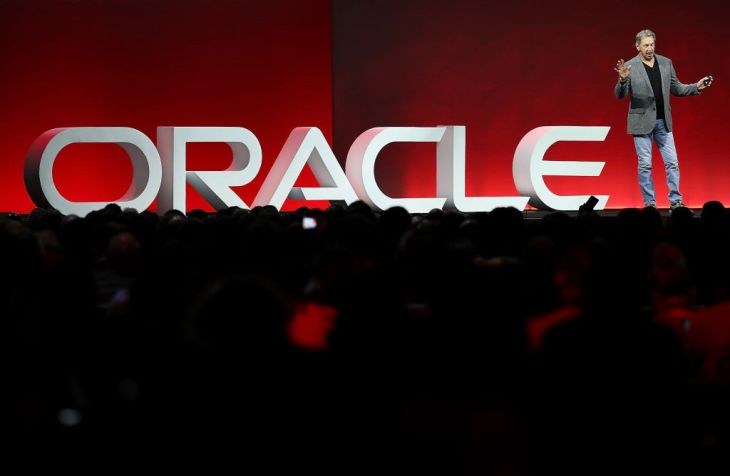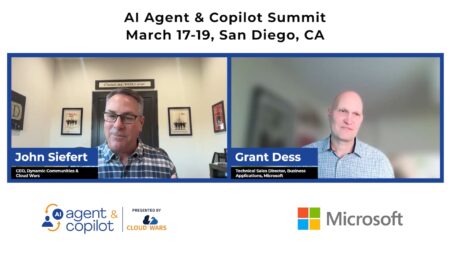Leaning into Oracle’s strong fiscal-Q3 earnings results, founder and chairman Larry Ellison tried last week to make the case that his contentious company is winning its battles in the cloud with primary rivals Workday, Amazon and SAP.
While Ellison always uses Oracle’s quarterly earnings calls to claim superiority over his rivals, he can be particularly pointed when those calls coincide with great results from Oracle.
And whatever you might think about Oracle as a company or Ellison’s blunt style, the company wields outsized impact in the tech industry for three reasons:
- its dominant market share in the strategically vital database business;
- the breadth and depth of its product portfolio, particularly in the cloud; and
- Ellison himself, who leverages those first two factors plus his extraordinary track record and strategic vision to relentlessly challenge and disrupt competitive norms.
So in the wake of Oracle’s better-than-expected results for the quarter, it can be highly illuminating to see the world—at least temporarily—through Ellison’s eyes. He very clearly has a wildly subjective perspective on things, but over the past four decades Larry Ellison—subjective or not—has been right far more frequently than he’s been wrong.
“I’ve never seen an opportunity like this.”
I frequently disagree with Ellison’s claims—his digs at longtime rival SAP often include exaggerations and outright falsehoods—but, again, for all of his Oracle-centric biases, he often sees the world as it is becoming more clearly than most people do.
So is this concluding remark from Ellison at the end of the earnings call just some competitive bluster, or could it indicate a potentially disruptive shift in this highly strategic market?
“I’ve never seen an opportunity like this to take out the winner of the on-premise ERP wars. They beat us in the on-premise wars—but it looks like they missed the cloud entirely.
“So the scale of this opportunity is enormous,” said Ellison.
Keeping in mind that this is one executive’s perspective—and we’ve frequently shared those from other CEOs just as expansively—let’s check out some additional perspectives offered by Ellison during last week’s earnings call.
Ellison’s View: Whipping Workday in ERP, Growing Faster in HCM
In his opening remarks—which most executives use to touch on their top-priority messages—Ellison explained that the market for ERP in the cloud will be much larger than for traditional on-premises ERP, and that Oracle’s far ahead of all competitors.
“We expect the Cloud ERP market segment to be 2 times to 3 times larger than the prior on-premise ERP software market. We already have a huge lead in the Cloud ERP market with over 7,000 Fusion ERP customers and 21,000 NetSuite ERP customers. Our primary ERP competitors are struggling,” Ellison said.
In Workday’s case, that claim is hard if not impossible to support Workday’s Financials business has been growing around 50% for the past few quarters, and its Adaptive Planning Insights business is growing at an even higher rate. I dug into this in detail in two recent analyses: Workday Vs. Oracle and SAP: Turning Up Heat in Red-Hot Financials Market and Workday CEO Hammers Oracle and SAP over Shortcomings in Fortune 500.
Is Oracle’s ERP business larger than Workday’s Financials plus Planning? It might be, but neither side breaks out revenue figures so it’s impossible to say with certainty. My guess is Oracle is indeed ahead of Workday but not because Workday is in any way “struggling,” as Ellison claimed.
So when Ellison added that “Workday… is seeing very little success in Cloud ERP,” that’s just not true.
More compelling were Ellison’s comments in his opening remarks regarding his company’s progress and competitive positioning versus Workday’s flagship HCM product line. If, as Ellison claims, business customers are beginning to bundle the purchases of ERP and HCM from a single vendor, that could have huge implications across the SaaS business.
“Workday’s lack of success in Cloud ERP is also creating opportunities for Oracle in Cloud HCM,” Ellison said.
“HCM increasingly is being purchased as a part of an ERP cloud application suite. As a result, Oracle now has more HCM customers than Workday, and Fusion HCM revenue is growing faster than Workday.”
While I don’t have the latest 1:1 comparative figures that Ellison alluded to but did not supply, some details indicate that for at least the short term, Ellison is completely correct in saying that Oracle’s Fusion HCM business is growing more rapidly than Workday’s HCM business. For Oracle’s quarter ended Feb. 29, it said its Fusion HCM revenue grew 27%. That’s significantly higher than the “high teens” guidance for Workday HCM Bhusri offered for Workday’s fiscal 2021, which will end Jan. 31, 2021.
Ellison’s View: Oracle’s Kicking AWS
Ellison would love to cut into Amazon’s massive public-cloud infrastructure business. So far, he has been unable to do so. Oracle’s best—and probably only—chance to begin doing so is centered on its Autonomous Database, which Ellison has called the most important product Oracle’s ever introduced.
Because the Oracle Database has dominant market share around the world, Ellison is flipping the rules of the cloud game by positioning the Autonomous Database as part of Oracle’s cloud-infrastructure business.
So if business customers decide that as part of their journeys to the cloud they want to migrate their mission-critical Oracle databases to the revolutionary new cloud-native database—and it is likely that hundreds of thousands will do exactly that—then they will also have to buy Oracle’s “Gen 2” cloud infrastructure. (You can see more on that in Larry Ellison Redefines Cloud as Oracle Autonomous Database Surges.)
Cloud Wars
Top 10 Rankings — Mar. 16, 2020
| 1. Microsoft —CFO Amy Hood bullish as customers make “multiyear commitments” |
| 2. Amazon — My ‘open letter’ to Jassy: don’t behave like predator but talk like pacifist |
| 3. Salesforce —Benioff overhauls top leadership to confront modern market realities |
| 4. Google — Up from #6: customer-first culture, grows 53%, new AI-powered solutions |
| 5. SAP — co-CEO Klein shoots down Ellison claim re Oracle nabbing big SAP customer |
| 6. Oracle — Ellison redefines cloud layers around unrivaled Autonomous Database |
| 7. IBM — 5 steps new CEO Arvind Krishna can take to reinvigorate growth potential |
| 8. Workday — Bhusri says his Financials business will grow 40%-plus in fiscal 2021 |
| 9. ServiceNow — Can McDermott be king-maker in Salesforce-SAP battle for CRM? |
| 10. Adobe — Digital Experience business up 24% to $859M in Q4 |
Ellison emphasized that Autonomous Database not only requires no human labor but also has additional technological capabilities that Amazon’s AWS databases can’t match.
“Another thing that people may not know about Autonomous Database it that it’s both serverless and elastic. When your application isn’t running on the Oracle Public Cloud, you don’t pay for any CPUs. You’ve got no CPUs dedicated to you and you’re not paying for servers,” Ellison said.
“That is not true of Amazon databases. If you have Redshift, you pay for the right Redshift processors. If you have their MySQL implementation, you pay for those processors.”
And customers, he said, are starting to understand the significance of that.
“What this has translated to is people are benchmarking us. They actually bring an application to Oracle and they bring an application to AWS and they’re shocked to find that we are much, much less expensive than AWS, even though we’re more secure and we’re faster.
“And once they discover that—once they do a trial and they do a comparison and they discover that, then they’re picking us.”
Ellison’s View: Oracle Sacking SAP
Here’s where Ellison can be his own worst enemy. Three months ago, during Oracle’s fiscal-Q2 earnings call, Ellison said that a huge SAP customer in Germany was in the final stages of dropping SAP ERP and converting to Oracle Fusion ERP in the cloud. Ellison specified that this would happen in mid-March, and that once other big SAP customers saw this defection, others would follow suit. SAP categorically denied any such defection, which you can read about in Oracle-SAP Showdown: SAP Calls BS on Larry Ellison Claim of Snatching Huge SAP Customer.
So here we are, 3 months after that claim. And on the earnings call Ellison never mentioned this celebrated cutover customer. Not a peep, not a hint.
Instead, in last week’s earnings call, Ellison pumped up the “just wait for it” story, saying that now not just one but “more than 10” of “the most famous companies in the world” are in the picture.
But while the quantity of these unidentified companies spiked from what Ellison had claimed 3 months earlier, the scale of the commitment he described fell dramatically.
In December, when it was just one company, Ellison described a complete rip-and-replace with SAP going out and Oracle Fusion ERP going in.
But last week, when the number jumped to “more than 10,” the commitment slipped from total migration to “giving us divisions to put Fusion ERP in.”
Ellison indirectly clarified that would end up being one division when a moment later he added that “one company has given us multiple divisions.”
The Upshot
So what does this all mean, and why does it deserve so much scrutiny?
- SAP has an unmatched set of customers and relationships, great technology vision, and formidable leaders. Those leaders need to take this threat seriously and articulate their own story as vigorously and as boldly as Ellison has done in making his case to the public.
- Ellison is 100% correct in saying that the market for cloud ERP will be huge. So the implications for business customers and the vendors they choose are enormous.
- If—and at this stage it’s a big “if”—Oracle is able to get inside some big SAP ERP customers even if just at the division level, that will be a big victory for Oracle and one that SAP will have to try to counter with an existential level of commitment.
- If Ellison’s story continues to change but remains vague and is always getting pushed out another 3 months or so, his credibility and that of Oracle will take big hits. SAP would be wise to pounce, relentlessly.
- And most important of all: on a larger scale, the savage competition in the Cloud Wars—typified here by Oracle’s battles with Workday, Amazon and SAP—continues to deliver massive value to business customers who reap the fruits of better and faster innovation, better pricing, better commitments to success and better overall experiences.
RECOMMENDED READING
Oracle-SAP Showdown: SAP Calls BS on Larry Ellison Claim of Snatching Huge SAP Customer
SAP Hits Back at Larry Ellison’s Claim that Oracle’s Snatching ERP Customers
Workday Vs. Oracle and SAP: Turning Up Heat in Red-Hot Financials Market
Workday CEO Hammers Oracle and SAP over Shortcomings in Fortune 500
SAP Blockbusters: Bets Future on Qualtrics, Hedges on 2025 Deadline
Salesforce-SAP Showdown: Will Bill McDermott and ServiceNow Be CRM King-Makers?
Oracle Against the World: Ellison Trashes SAP & Workday but Grows Only 1%
Subscribe to the Cloud Wars Newsletter for in-depth analysis of the major cloud vendors from the perspective of business customers. It’s free, it’s exclusive, and it’s great!








